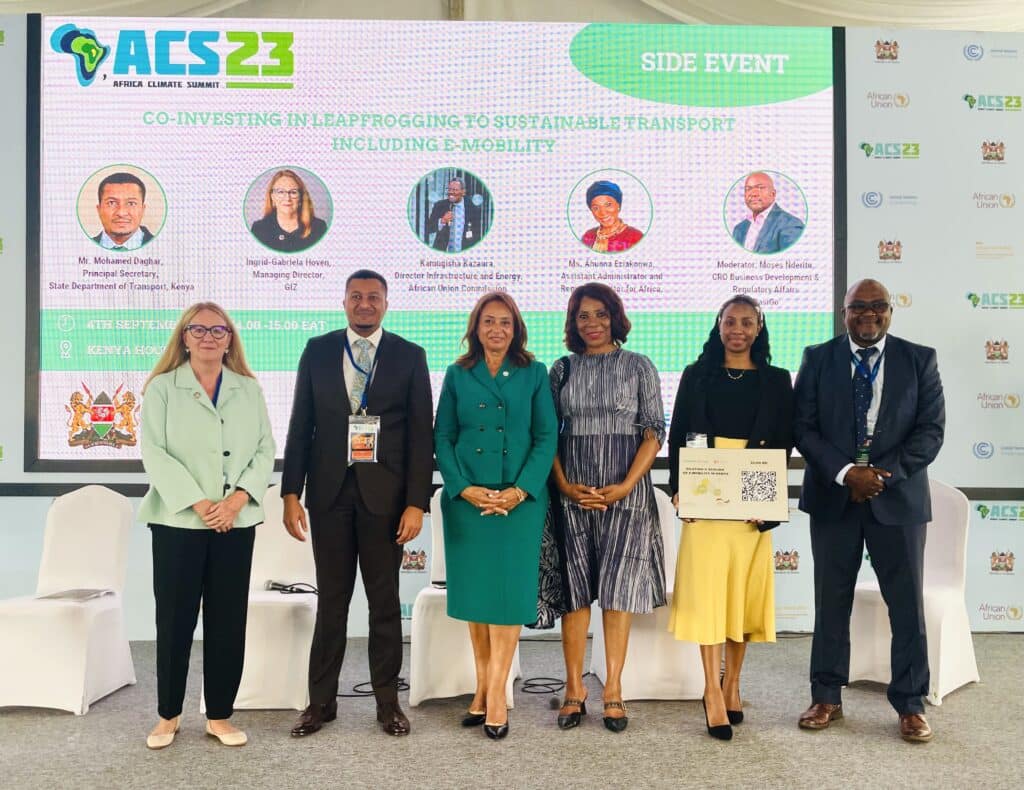
In an era where the global consensus increasingly gravitates towards cleaner and more sustainable transport solutions, Africa stands at a crucial juncture. The continent must decide whether it will continue to grapple with outdated fossil-fuel-based mobility or leapfrog into a future aligned with the Sustainable Development Goals (SDGs) and the Paris Agreement. The choices made today will determine both Africa’s and the world’s trajectories, as the transport sector plays a central role in global emissions.
The first ever Africa Climate Summit (ACS), which took place in Nairobi from September 4th to 6th, 2023, marked a historic milestone for showcasing the continent’s climate leadership and potential. The primary goal of the summit was to address the challenges and opportunities associated with green growth and climate finance in Africa and on a global scale. It also sought to amplify Africa’s voice and influence in the imminent global climate negotiations.
Can we consider the ACS a resounding success that lived up to its promises and lofty expectations, or did it fall short of its potential impact? To evaluate the summit’s outcomes, we need to examine its relevance to one of the most pressing concerns on the African climate action agenda: sustainable transport. How did the ACS contribute to advancing the sustainable transport ambition in Africa, and what implications does it hold for the continent’s future in this crucial area?
A significant outcome of the ACS was the unanimous adoption of the “Nairobi Declaration” by African and global leaders, reflecting a commitment to addressing climate change challenges while harnessing Africa’s potential as a green powerhouse. The declaration has a robust focus on both mitigation and adaptation strategies, acknowledging the dual imperative of reducing greenhouse gas emissions and strengthening Africa’s resilience to a changing climate. Within this comprehensive framework, discussions towards mitigation efforts emphasize the acceleration of decarbonization in key sectors, with a particular spotlight on transport. Simultaneously, the declaration places a strong emphasis on leveraging smart, digital, and highly efficient technologies, and systems. Such a focus is also pivotal to enhance the efficiency and sustainability of transport systems in Africa.
The ACS served as a platform for a multitude of transport-focused side events, each drawing significant interest. Events such as “Co-investing in Leapfrogging to Sustainable Transport, including E-Mobility,” hosted by the Kenyan Ministry of Roads and Transport in collaboration with GIZ and other partners, and “Investing in Green Transport in Africa,” hosted by ITDP, were brimming with valuable ideas and key learnings that could advance Africa’s transition agenda.
These high-level events brought together diverse panels of experts and stakeholders. It was particularly noteworthy how the insights and perspectives shared during these discussions closely mirrored the discussions points articulated in the paper “Leapfrogging to sustainable transport in Africa”. As highlighted by the Managing Director of GIZ, this thought provoking publication greatly inspired the “Rethinking Transport” initiative, with strong expectations for the project’s transformative impact in Africa.
Kenya set an inspiring precedent by organizing a captivating electric mobility parade just before the summit, showcasing the vibrant evolution in the electric mobility sector. Fleet electrification is the priority for the new government as part of its strategy to leapfrog into sustainable transport. Kenya’s strategic advantage lies in harnessing its sustainable green energy grid, currently exceeding 92% sustainability. Moreover, the growing interest in e-mobility emerged as a central theme for transport- related events during the ACS.

However, while e-mobility holds tremendous promise in reducing carbon emissions and mitigating the impacts of climate change, it was clear from the discussions that it alone cannot fully address transport challenges. Instead, a holistic approach, combining e-mobility with a broader transformation of the transport sector, was advocated. Such a comprehensive strategy requires multiple points of actions, as highlighted throughout the discussions : policy reform, technology adoption, capacity building and a concerted effort to promote sustainable transport in all its dimensions.
The summit emphasized that for transport to genuinely contribute to sustainable development, it must prioritize social justice as a foundational principle. Transportation systems often intersect with broader societal challenges, disproportionately affecting marginalized communities and exacerbating existing inequalities. To date, transport systems are not adequately planned for women. The persistent gender bias in transport planning limits women’s access to education, basic services, and economic opportunities.
Greater safety in the sector is needed, with a focus on addressing the disproportionate impact on women.
Ahunna Eziakonwa, UNDP

In response to these challenges, there is a need for concerted efforts to improve safety and inclusivity within the transport sector, while exploring further opportunities to help women play their part in this revolution. This includes ensuring female representation and participation in transport-related decision-making processes and providing more training and awareness programs to address safety concerns.
As Africa faces mounting climate challenges, there is a need to rely on evidence-based decisions more than ever. At the summit, the call for data-driven approaches resonated strongly, advocating for a meticulous examination of data to better understand how transportation changes affect individuals and systems, and further develop policies that ensure inclusivity and efficiency throughout the transformation process.
The significance of data for policy-making raises questions around data collection, access, and utilization, as well as building the necessary capacity to turn data into actionable insights. The next steps involve forging partnerships, investing in technological infrastructure, and nurturing a culture of data literacy across the continent.
Leveraging digital tools and data-driven solutions can enhance the efficiency, safety, and sustainability of transport systems in Africa.
H.E. Amani Abou-Zeid, African Union

More collaborative investments in the transport sector are needed for a sustainable future for all. The continent expects its population to double by 2050, accompanied by rapid urbanization. The need has emerged to embark on a sustainable transport strategy that avoids repeating the mistakes of the global North, while meeting the diverse and dynamic needs of the continent’s population. This ambitious goal requires considerable financial resources. It is therefore imperative to identify and adopt various sources of financing capable of supporting the considerable investments required to transform transport in Africa.

More partnerships will be important in advancing sustainable transport in Africa; the approach should be country-driven and people-centered.
Ingrid-Gabriela Hoven, GIZ
The continent is increasingly interested in strategic partnerships between governments, private sector entities and development partners. During the summit, governments, banks and private investors committed a total of $23 billion to finance projects to support natural resources conservation and the development of renewable energy infrastructure across Africa. Future efforts should therefore involve facilitating cross-sector collaboration and promoting innovative financing mechanisms tailored to Africa’s unique context.
The Africa Climate Summit marked an important milestone in the resolution of the African continent’s environmental problems, with numerous commitments made in the “Nairobi Declaration”. Over the coming months, the challenge will be to translate formal commitments into tangible results, while all eyes are already on the next global event: COP28 in Dubai. Consequently, the success or failure of the summit will depend on how its results are followed up and implemented in the future. From various discussions at side events, the transport message for COP28 could read as follows:
Rethinking Transport is a GIZ self-financed initiative, implemented by GIZ and Agora Verkehrswende.